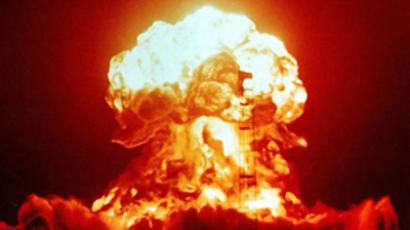Russia and Israel sign military agreement
A new five year plan has been hammered out and signed during a meeting of the Russian and Israeli defense ministers in Moscow.
The agreement boosts military ties between the two nations to help them fight common threats, such as terrorism and the proliferation of weapons of mass destruction.
The agreement inked today by Russian Defense Minister Anatoly Serdyukov and his Israeli counterpart Ehud Barak sketches out the further military co-operation between the two countries for the next five years.
Specifically one of the highlights of the document is that Russia will buy 12 UAVs from Israel. The Russian minister said that 50 technicians are already being taught to operate them.
There was also a talk to build a joint facility where those drones will be built, because Russia expressed desire to participate in manufacturing of the UAVs.
The document also sketches out details of further military cooperation: an exchange of experience and information in spheres of mutual interests, which includes issues of international security. It also dwells on development of military education, medicine, physical training and other issues.
“Our views on many modern challenges are close or coincide,” acknowledged Russia’s Defense Minister. “First of all, it has to do with terrorism and non-proliferation of weapons of mass destruction.”
In turn, Ehud Barak pointed out that Israel follows closely the situation with terrorism in Russia’s North Caucasus, because both Russia and Israel are under the threat of radical Islamic terrorism.
Aryeh Levin, former Israeli ambassador to Russia from 1988 to 1992, thinks the important thing is not only a technical aspect of fighting terrorism, but also cooperation between Russian and Israeli intelligence services.
“The intelligence cooperation in fighting terrorism is now worldwide. And between such two countries that have common interests, this might be very important,” he told RT.
The editor in chief of the National Defense magazine in Russia, Igor Korotchenko, says the position of the US could be hampering progress in Russian-Israeli military ties.
“Israel is one of the world's leading manufacturers of drones,” he told RT. “Russia is interested in getting access to these technologies. Moscow would also like to set up a joint venture to produce these aircraft in Russia. One of the obstacles in the way of this is Washington's position. Israel is a strategic partner of the US, and is dependent on its opinion. Washington doesn't want to see Russia getting access to the latest military technologies. Maybe during these meetings in Moscow, Russia and Israel will be able to find a mutually acceptable solution.”
Dr. Ely Karmon of the International Institute for Counterterrorism also thinks that there could be a conflict of interests. However, he added that “Israel can develop such a kind of cooperation with Russia.”
“The more strategic and political cooperation will be closer, the more it will be easier to exchange technological and military experience,” he stressed.
The relations between Moscow and Tel-Aviv are growing stronger by the year, though concerns are numerous, particularly dealing with Russia’s relations with Israeli closest neighbours Syria and Lebanon, with which Russia builds close military cooperation, like selling supersonic anti-ship missiles to Syria – a move that raises serious concerns in Tel-Aviv. Israel is even attempting to put pressure on Russia to back off from the deal, saying the missiles could possibly fall into the hands of Islamic radicals.
However, Russia says that, despite hearing Israel’s concerns, it will continue to comply with its international obligations.
In addition, Russia is a key member of the so-called Middle East Quartet. With the peace talks continuing between Israel and Palestinian autonomous republic, Russia plays a crucial role as a peace mediator.
Ehud Barak’s visit to Russia will last until September 7.













